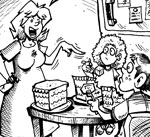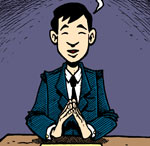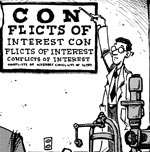Idiopathic Insomnia - Rare Form of Lifelong Insomnia with No Visible Cause
| Share on Facebook | Share on Twitter | Share on Google+ |
Baby Mark kept his parents up at night even when he wasn't hungry or needed changing. By age two, Mark was still keeping his parents awake from dusk until dawn by playing, exploring, and trying to go outside at all hours. And as a teenager, Mark never seemed to sleep, no matter how much did during the day. Mark suffered idiopathic insomnia.
Idiopathic Insomnia Defined
Idiopathic insomnia may cause its sufferers and those around them to mutter "Stupid insomnia!" but the term "idiopathic" only means that it has no discernible cause. Idiopathic insomnia begins at birth and continues throughout life. Idiopathic insomnia is also known as primary insomnia.
Idiopathic insomnia is defined in terms of what it is not. Idiopathic insomnia is not caused by a psychological disturbance. It is not caused by a medication or a diagnosed physical disease. It lasts more than a month, and it causes daytime fatigue and dysfunction—although people who have suffered from this form of insomnia all their lives usually aren't aware of them. This form of insomnia is quite rare, affecting only about 1 in 100 people, males and females having the condition in approximately equal numbers.
The Causes of Idiopathic Insomnia
Scientists believe that a lesion in the brain interferes with the normal functioning of the brain's sleep and wakefulness centers. Since locating the brain lesion would not result in effective treatment and the surgery involved could be worse than the disease, most cases of primary insomnia are diagnosed only on the basis of symptoms. An appointment with a sleep lab may be scheduled to make sure the insomnia does not result from some other form of the disease.
Treatment of Idiopathic Insomnia
The most common medical treatment of idiopathic insomnia is a prescription for a benzodiazepine tranquillizer. Benzodiazepine drugs include an extraordinarily large list of medications including brotizolam (Bondormin, Dormex, Lendorm, Lendormin, Noctilan, Sintonal), estazolam (Prosom), lormetazepam (Loramet, Pronoctan), quazepam (Doral), and triazolam (Halcion). Taken 30 minutes to 4 hours before going to bed, these hypnotic tranquillizers are designed to provide restful sleep without stopping normal breathing. These drugs are used instead of other more common, benzodiazepine medications because they are less likely to cause dependence having to use the drug to get to sleep at all.
Many people who have had idiopathic insomnia all their lives, however, have adjusted to it and don't need treatment. Sleeping pills are only prescribed when insomnia causes daytime drowsiness or dangerous inattention to vital tasks, such as driving. Getting the dosage of sleep medication right, however, is difficult, so many people with this condition choose to deal with symptoms by non-medical means.
Some of the same self-help methods used for other forms of chronic insomnia also work for idiopathic insomnia:
- Exercising during the day, not in the early morning, and not in the evening. When you work out hard enough that your muscles need to rebuild themselves, sleep comes more easily. The downside to this approach is that it is necessary to take care not to stress the same muscle groups more often than every 48 hours.
- Avoid naps, which make it harder to fall asleep at night.
- Minimize alcohol, caffeine, and nicotine, especially in the evening, for several hours before bedtime.
- Train your brain to follow a set schedule for going to bed and getting up. Make sure your schedule allows for six to eight hours of uninterrupted sleep.
- Create a bedtime routine for the 30 minutes before it's time to go to bed. The habits you practice getting ready for sleep help signal your brain it's time to sleep.
Selected Reference:
Mahowald, M.W. (March 2000). "What is causing excessive daytime sleepiness?: evaluation to distinguish sleep deprivation from sleep disorders" (Online, full text). Postgraduate Medicine 107 (3): 108-23.
-
Skin CareMen Skin Care
-
Free ResourcesFree eBooks
-
The... patient should be made to understand that he or she must take charge of his own life. Don't take your body to the doctor as if he were a repair shop.Quentin Regestein
-
Featured Health Supplement
 If you find a product that is as effective as Total Balance, and is better value for money, let us know and we will give you a refund equivalent to your entire purchases of Total Balance…retrospective.
If you find a product that is as effective as Total Balance, and is better value for money, let us know and we will give you a refund equivalent to your entire purchases of Total Balance…retrospective.
-



















